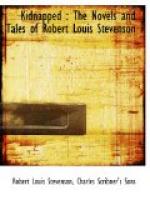He then began to question me cunningly, where I came from, whether I was rich, whether I could change a five-shilling piece for him (which he declared he had that moment in his sporran), and all the time he kept edging up to me and I avoiding him. We were now upon a sort of green cattle-track which crossed the hills towards Torosay, and we kept changing sides upon that like ancers in a reel. I had so plainly the upper-hand that my spirits rose, and indeed I took a pleasure in this game of blindman’s buff; but the catechist grew angrier and angrier, and at last began to swear in Gaelic and to strike for my legs with his staff.
Then I told him that, sure enough, I had a pistol in my pocket as well as he, and if he did not strike across the hill due south I would even blow his brains out.
He became at once very polite, and after trying to soften me for some time, but quite in vain, he cursed me once more in Gaelic and took himself off. I watched him striding along, through bog and brier, tapping with his stick, until he turned the end of a hill and disappeared in the next hollow. Then I struck on again for Torosay, much better pleased to be alone than to travel with that man of learning. This was an unlucky day; and these two, of whom I had just rid myself, one after the other, were the two worst men I met with in the Highlands.
At Torosay, on the Sound of Mull and looking over to the mainland of Morven, there was an inn with an innkeeper, who was a Maclean, it appeared, of a very high family; for to keep an inn is thought even more genteel in the Highlands than it is with us, perhaps as partaking of hospitality, or perhaps because the trade is idle and drunken. He spoke good English, and finding me to be something of a scholar, tried me first in French, where he easily beat me, and then in the Latin, in which I don’t know which of us did best. This pleasant rivalry put us at once upon friendly terms; and I sat up and drank punch with him (or to be more correct, sat up and watched him drink it), until he was so tipsy that he wept upon my shoulder.
I tried him, as if by accident, with a sight of Alan’s button; but it was plain he had never seen or heard of it. Indeed, he bore some grudge against the family and friends of Ardshiel, and before he was drunk he read me a lampoon, in very good Latin, but with a very ill meaning, which he had made in elegiac verses upon a person of that house.
When I told him of my catechist, he shook his head, and said I was lucky to have got clear off. “That is a very dangerous man,” he said; “Duncan Mackiegh is his name; he can shoot by the ear at several yards, and has been often accused of highway robberies, and once of murder.”
“The cream of it is,” says I, “that he called himself a catechist.”
“And why should he not?” says he, “when that is what he is. It was Maclean of Duart gave it to him because he was blind. But perhaps it was a peety,” says my host, “for he is always on the road, going from one place to another to hear the young folk say their religion; and, doubtless, that is a great temptation to the poor man.”




